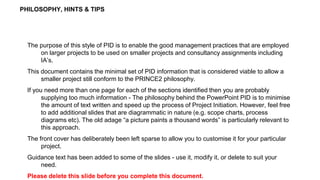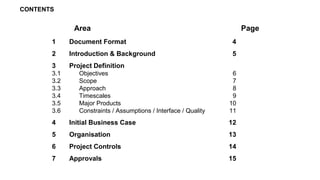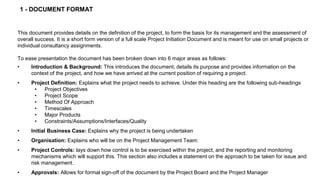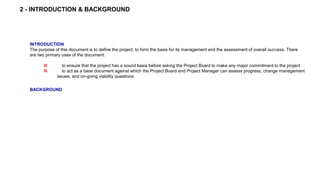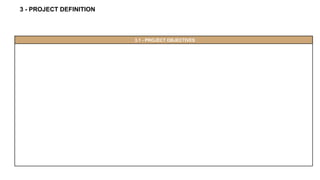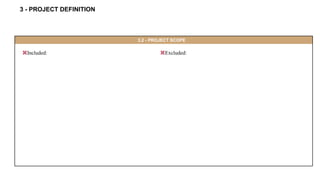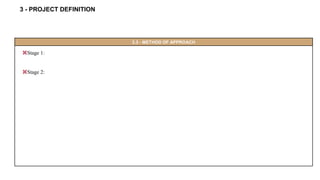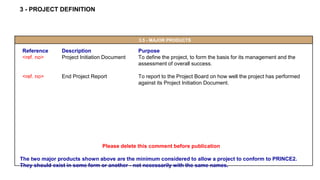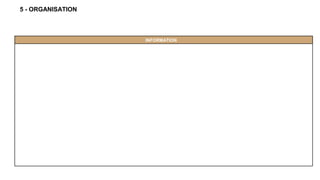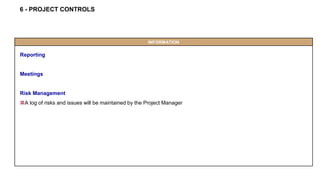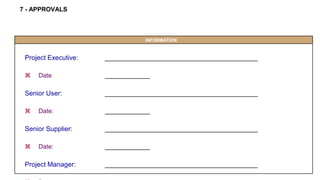Mini PID
- 1. Deliver Fast ŌĆō with Governance and Control Mini PID Manoj Agarwal January, 2017
- 2. The purpose of this style of PID is to enable the good management practices that are employed on larger projects to be used on smaller projects and consultancy assignments including IAŌĆÖs. This document contains the minimal set of PID information that is considered viable to allow a smaller project still conform to the PRINCE2 philosophy. If you need more than one page for each of the sections identified then you are probably supplying too much information - The philosophy behind the PowerPoint PID is to minimise the amount of text written and speed up the process of Project Initiation. However, feel free to add additional slides that are diagrammatic in nature (e.g. scope charts, process diagrams etc). The old adage ŌĆ£a picture paints a thousand wordsŌĆØ is particularly relevant to this approach. The front cover has deliberately been left sparse to allow you to customise it for your particular project. Guidance text has been added to some of the slides - use it, modify it, or delete to suit your need. Please delete this slide before you complete this document. PHILOSOPHY, HINTS & TIPS
- 3. Area Page 1 Document Format 4 2 Introduction & Background 5 3 Project Definition 3.1 Objectives 6 3.2 Scope 7 3.3 Approach 8 3.4 Timescales 9 3.5 Major Products 10 3.6 Constraints / Assumptions / Interface / Quality 11 4 Initial Business Case 12 5 Organisation 13 6 Project Controls 14 7 Approvals 15 CONTENTS
- 4. This document provides details on the definition of the project, to form the basis for its management and the assessment of overall success. It is a short form version of a full scale Project Initiation Document and is meant for use on small projects or individual consultancy assignments. To ease presentation the document has been broken down into 6 major areas as follows: ŌĆó Introduction & Background: This introduces the document, details its purpose and provides information on the context of the project, and how we have arrived at the current position of requiring a project. ŌĆó Project Definition: Explains what the project needs to achieve. Under this heading are the following sub-headings ŌĆó Project Objectives ŌĆó Project Scope ŌĆó Method Of Approach ŌĆó Timescales ŌĆó Major Products ŌĆó Constraints/Assumptions/Interfaces/Quality ŌĆó Initial Business Case: Explains why the project is being undertaken ŌĆó Organisation: Explains who will be on the Project Management Team: ŌĆó Project Controls: lays down how control is to be exercised within the project, and the reporting and monitoring mechanisms which will support this. This section also includes a statement on the approach to be taken for issue and risk management. ŌĆó Approvals: Allows for formal sign-off of the document by the Project Board and the Project Manager 1 - DOCUMENT FORMAT
- 5. 2 - INTRODUCTION & BACKGROUND INTRODUCTION The purpose of this document is to define the project, to form the basis for its management and the assessment of overall success. There are two primary uses of the document: ’ü║ to ensure that the project has a sound basis before asking the Project Board to make any major commitment to the project ’ü║ to act as a base document against which the Project Board and Project Manager can assess progress, change management issues, and on-going viability questions. BACKGROUND
- 6. 3.1 - PROJECT OBJECTIVES 3 - PROJECT DEFINITION
- 7. ’ü║Included: ’ü║Excluded: 3.2 - PROJECT SCOPE 3 - PROJECT DEFINITION
- 8. ’ü║Stage 1: ’ü║Stage 2: 3.3 - METHOD OF APPROACH 3 - PROJECT DEFINITION
- 9. 3.4 - TIMESCALES 3 - PROJECT DEFINITION
- 10. Reference Description Purpose <ref. no> Project Initiation Document To define the project, to form the basis for its management and the assessment of overall success. <ref. no> End Project Report To report to the Project Board on how well the project has performed against its Project Initiation Document. 3.5 - MAJOR PRODUCTS 3 - PROJECT DEFINITION Please delete this comment before publication The two major products shown above are the minimum considered to allow a project to conform to PRINCE2. They should exist in some form or another - not necessarily with the same names.
- 11. CONSTRAINTS ASSUMPTIONS INTERFACES QUALITY 3.6 - CONSTRAINTS / ASSUMPTIONS / INTERFACES / QUALITY 3 - PROJECT DEFINITION
- 12. INFORMATION 4 - INITIAL BUSINESS CASE
- 14. INFORMATION 6 - PROJECT CONTROLS Reporting Meetings Risk Management ’ü║A log of risks and issues will be maintained by the Project Manager
- 15. INFORMATION 7 - APPROVALS Project Executive: _________________________________________ ’ü║ Date: _____________ Senior User: _________________________________________ ’ü║ Date: _____________ Senior Supplier: _________________________________________ ’ü║ Date: _____________ Project Manager: _________________________________________

